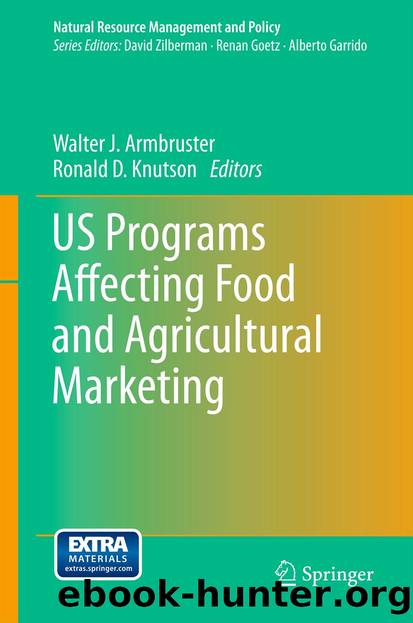US Programs Affecting Food and Agricultural Marketing by Walter J. Armbruster & Ronald D. Knutson

Author:Walter J. Armbruster & Ronald D. Knutson
Language: eng
Format: epub
Publisher: Springer New York, New York, NY
Source: FDA (2011); Ribera and Knutson (2011)
Food Safety and Traceability Impacts of Private Initiatives and Food Chain Globalization
One of the most striking developments in the arena of food safety and traceability over the last decade has been the emergence of private regulatory initiatives supporting contract relations between partners at different levels of food chains. These private standards are designed by commodity producers, processors, or retailers and are typically written in best practice format. They are often drawn from domestic or international standards, but typically impose stricter conditions than the legal rule. Also, they often include both food safety and record keeping/traceability provisions. One example is the California Leafy Green Products Handler Marketing Agreement (LGMA), which was created in the aftermath of the spinach recall of 2006 and was subsequently endorsed by the State of California (CDFA 2008). The California Leafy Greens Marketing Agreement is mandatory for all members and specifies food safety practices at the farm level, includes a traceability system and is monitored by the California Department of Food and Agriculture inspectors (LGMA 2010).3 Similar to other initiatives the emphasis is on trust and risk-based food safety practices.
Along with producer-led food safety standards there have also been a growing number of retailer initiatives. A key example is GlobalGAP, which is being used by leading food retail chains such as Wal-Mart—imposed on suppliers of its private label products and other food categories, especially produce (see Box 10.4). Similar standards can be benchmarked and recognized as equivalent under the Global Food Safety Initiative (GFSI).
The GlobalGAP standard originated in Europe but now has global reach, being used by over 100,000 farmers, from 100 countries across the globe (GlobalGAP 2010). GFSI currently recognizes 11 standards as equivalent (GFSI 2011c). The advantages of such private standards compared to public initiatives include Global reach
Download
This site does not store any files on its server. We only index and link to content provided by other sites. Please contact the content providers to delete copyright contents if any and email us, we'll remove relevant links or contents immediately.
International Integration of the Brazilian Economy by Elias C. Grivoyannis(108851)
The Radium Girls by Kate Moore(12013)
Turbulence by E. J. Noyes(8040)
Nudge - Improving Decisions about Health, Wealth, and Happiness by Thaler Sunstein(7689)
The Black Swan by Nassim Nicholas Taleb(7104)
Rich Dad Poor Dad by Robert T. Kiyosaki(6600)
Pioneering Portfolio Management by David F. Swensen(6283)
Man-made Catastrophes and Risk Information Concealment by Dmitry Chernov & Didier Sornette(6001)
Zero to One by Peter Thiel(5784)
Secrecy World by Jake Bernstein(4739)
Millionaire: The Philanderer, Gambler, and Duelist Who Invented Modern Finance by Janet Gleeson(4462)
The Age of Surveillance Capitalism by Shoshana Zuboff(4273)
Skin in the Game by Nassim Nicholas Taleb(4235)
The Money Culture by Michael Lewis(4196)
Bullshit Jobs by David Graeber(4177)
Skin in the Game: Hidden Asymmetries in Daily Life by Nassim Nicholas Taleb(3987)
The Dhandho Investor by Mohnish Pabrai(3757)
The Wisdom of Finance by Mihir Desai(3727)
Blockchain Basics by Daniel Drescher(3574)
